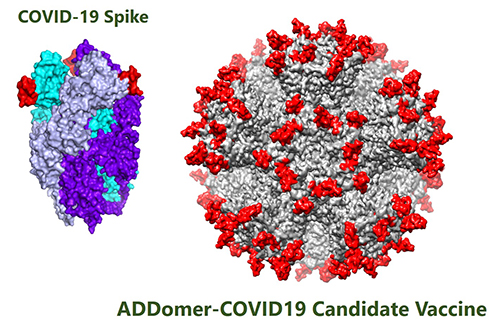
COVID-19 Spike protein is shown. Parts mediating cell entry are coloured red. Imophoron’s ADDomer©-based candidate vaccines present exactly these parts to the immune system, giving rise to antibodies to neutralize the virus and protect against infection
Press release issued:
7 April 2020
The University of Bristol and spin-out company Imophoron have announced they are ready to test COVID-19 vaccine candidates in a pre-clinical programme.
Researchers from the University's COVID-19 Emergency Research Group (UNCOVER) have joined forces with Imophoron, who has produced multiple COVID-19 vaccine candidates, based on its novel vaccine platform (named the ADDomer©), within weeks of the virus sequence being made available.
The UK start-up, a biotech spin-out from the University's BrisSynBio, is leading on vaccine development and is looking for partners to further the development of the COVID-19 candidates and the ADDomer© platform.
The start-up, based at the Unit DX Incubator in Bristol, is developing a new, highly adaptable, easy-to-manufacture, rapid-response platform for vaccines to combat present and future infectious diseases. A key benefit is the speed with which candidate vaccines can be identified and could be manufactured in large quantities.
Imophoron's vaccines are extremely stable and require no refrigeration, potentially enabling unrestricted distribution world-wide. Importantly the high specificity of the vaccine particle promises a reduced risk of potentially dangerous side effects, seen with some novel vaccines.
Professor Imre Berger, co-founder at Imophoron and Director of the University’s Max Planck-Bristol Centre for Minimal Biology, added: "COVID-19 (SARS-CoV-2) infects cells using its so-called 'Spike' protein. Most COVID-19 vaccines now being fast-tracked present the complete Spike to the immune system, which reacts by making antibodies. This approach risks inducing antibodies that bind to the wrong parts of the Spike and could make the disease even worse. In vaccines for SARS-CoV-1, this sometimes resulted in severe lung tissue damage; Imophoron’s vaccines, in contrast, present only very specific parts of the Spike essential for cell entry and are potentially much less prone to this risk.”
Frederic Garzoni, Founder and CEO at Imophoron, said: "We have optimized our process and can now design and roll-out potential vaccines in about two weeks, ready for testing. With our technology, we hope to contribute to resolving the major health and economic threats caused by emerging viruses such as COVID-19."
Imophoron's platform, the ADDomer©, is a synthetic, self-assembling, nature-inspired virus-like particle (VLP). Currently at pre-clinical stage, vaccines based on the ADDomer© will need to be studied in human clinical trials once they have completed pre-clinical tests.
Professor Adam Finn, Director of the Bristol Children's Vaccine Centre at Bristol Medical School and co-ordinator of UNCOVER, explained: "We believe the approach has a number of potential advantages, including avoidance of induction of disease-enhancing antibody responses, ready manufacture and thermostability, avoiding the need for cold chain storage. The proven track record of the VLP concept for presentation of antigens to the human immune system, inducing substantial long-lasting antibody responses and clinical protection, also favours this approach."
Further information
Imophoron was founded in December 2017 by Frederic Garzoni and Imre Berger.
The journal Science Advances published a paper unveiling the technology in September 2019.
Bristol UNCOVER Group
In response to the COVID-19 crisis, researchers at the University of Bristol formed the Bristol COVID Emergency Research Group t(UNCOVER) to pool resources, capacities and research efforts to combat this infection.
Bristol UNCOVER includes clinicians, immunologists, virologists, synthetic biologists, aerosol scientists, epidemiologists and mathematical modellers and has links to behavioural and social scientists, ethicists and lawyers.
Follow Bristol UNCOVER on Twitter at: twitter.com/BristolUncover
For more information about the University of Bristol’s coronavirus (COVID-19) research priorities visit: www.bristol.ac.uk/research/impact/coronavirus/research-priorities/
Bristol UNCOVER is supported by the Elizabeth Blackwell Institute
Find out more about the Institute’s COVID-19 research looking into five key areas: virus natural history, therapeutics and diagnostics research; epidemiology; clinical management; vaccines; and ethics and social science.
About Imophoron
Imophoron is developing a novel vaccine platform for use in emerging infectious diseases and unmet medical needs. The platform is based on a single component of the human Adenovirus that spontaneously forms a superparticle, the ADDomer©.
About BrisSynBio, a BBSRC/ EPSRC-funded Synthetic Biology Research Centre
BrisSynBio is a multi-disciplinary research centre that focuses on the biomolecular design and engineering aspects of synthetic biology.
BrisSynBio is part of the Bristol BioDesign Institute.
Our overarching aims are to:
- Improve understanding of biological assemblies and processes to points that allow the rational and predictable design and engineering of biological and bio-inspired systems;
- Foster systematic, synthetic-biology approaches to the design and engineering of biological systems across scales from atoms and molecules to cells and tissues;
- Train the next generation of scientists and engineers in these approaches;
- Facilitate the translation of fundamental synthetic-biology research to industry and the clinic.
Unit DX
Unit DX is central Bristol's deep tech incubator, home to the city's most innovative science and engineering companies. We empower scientists as entrepreneurs, providing facilities, investment and mentoring. Our member companies are using emerging technologies such as biotechnology and synthetic biology, artificial intelligence, photonics and electronics, drones and robotics, advanced materials, and quantum computing to create new markets and deliver solutions to big societal problems.
For more information visit: www.unitdx.com
Support our COVID-19 research
Bristol's researchers are part of a global network of scientists responding urgently to the challenge of the coronavirus pandemic.
Find out how you can support their critical work.
